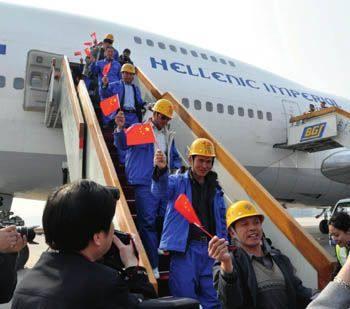Expat Security: the growing risks for Chinese abroad
WANG JINGLIE

AS the Chinese and world economies become increasingly integrated, more and more Chinese travel, work and study overseas. Annual trips abroad by Chinese nationals rose from a mere 280,000 in 1978 when China opened up to the world to more than 60 million in 2010, and continue to grow. From 2005 to 2011, the number of Chinese workers abroad rose from 3.5 million to 5.5 million, and at present more than 16,000 Chinese enterprises operate in other parts of the world.
The growing global presence of Chinese people, however, has been accompanied by a steep rise in instances of violence against Chinese abroad. The Foreign Ministry handles close to 30,000 cases every year concerning its peoples security in other countries.

A Grim T hreat
In recent years, there has been a slew of news stories about Chinese people being kidnapped, attacked or killed in foreign countries. Two such incidents made headlines at the beginning of this year, when a construction crew in Sudan and later a group of cement plant employees in Egypt were kidnapped, raising concerns about the security risks for Chinese citizens abroad.
In reality, these risks are high for anybody heading to a conflict zone, whatever their nationality. The Middle East and Africa have long been regions of great uncertainty and tension that threaten foreign citizens and businesses there, especially over the past year of political turmoil in the former.
In some cases Chinese people have been the unintended casualties of clashes between vying factions in conflict regions. In others they have been targeted as victims. Though the charitable and commercial projects Chinese companies are involved in benefit the national economy of host countries, their activities can infringe upon local or tribal interests, making Chinese workers the target of retaliation.
One of the most shocking instances of this was the June 2004 shooting of Chinese workers laying roads in the city of Kunduz in northeastern Afghanistan that left 11 dead and four injured. In February 2006, three Chinese engineers were shot dead in the Pakistani town of Hub, near Karachi. There are also repeated reports of crimes against Chinese travelers and businesspeople, such as the murder of a Chinese merchant during an armed robbery in Johannesburg in August 2004, and an incident in 2006 when several Chinese were held hostage for ransom in Nigeria.
Government Actions
The Chinese government has taken action in response to these events, and made an admirable start to improve security for Chinese citizens and organizations outside its borders. In 2004, the State Council met specifically on this topic, and the following year issues around protecting the lives and legitimate rights and interests of Chinese nationals living abroad were included in the annual report on the work of the government.
Guidelines for consular protection and services, updated annually, were introduced by the Ministry of Foreign Affairs as early as 2000, and since 2004 a raft of further measures has been introduced in response to the increasing security incidents abroad. In July 2004 the ministry established the Department of External Security, whose responsibilities include reporting on external security issues, making policy recommendations and overseeing related activities. In May 2006 the ministry set up a consular protection office under the Department of Consular Affairs, and at present several Chinese embassies and consulates employ police liaison officers to handle diplomatic and security issues experienced by Chinese citizens.
The Ministry of Foreign Affairs has also devised an emergency response mechanism with Chinese embassies and consulates. Once the alarm is raised, a contingency team is summoned to make an emergency plan. Hotlines between authorities provide a constant flow of updates on the situation that enable officials to make appropriate decisions and coordinate their actions.
Thanks to these contingency teams, Chinese embassies and consulates can provide a more professional and efficient service to Chinese citizens. In the past few years this emergency response mechanism has proved effective in a number of negotiation, mediation and evacuation maneuvers.
Last year the most striking of such situations occurred when Chinese authorities removed tens of thousands of citizens out of Libya in what was the largest and most complicated evacuation in PRC history. This huge operation involved the close coordination of six major government bodies, including the Ministry of Public Security and the Civil Aviation Administration, and several Chinese airlines and shipping companies. In addition to 76 flights on Air China, China Eastern and China Southern,vessels from China Shipping and COSCA, vehicles and ocean lines were charted locally and from neighboring countries to remove Chinese citizens from the war-torn country. A total of 35,860 Chinese citizens safely returned to their homeland.
stronger Measures needed
Despite these efforts, there is much more that embassies and consulates can and should do to better protect Chinese citizens abroad. China should learn from the practices of other countries and invest more resources in carrying out this duty. At present there are only 600 embassy and consulate officials handling security issues for some 60 million Chinese nationals abroad. This means that each official is responsible for 100,000 people every year – an impossible task.
China also needs to introduce more laws to protect Chinese citizens abroad and ensure their enforcement. For example, if China is to keep its citizens safe, its Emergence Response Law, enacted in 2007 and designed solely for emergencies at home, must be amended to cover overseas crises threatening Chinese establishments and nationals.
Furthermore, the safety of Chinese nationals abroad could be further improved if China were to sign international labor cooperation pacts that oblige other signatory countries to safeguard the legitimate rights and interests of Chinese enterprises and workers in their countries. In a situation where Chinese businessesand nationals properties and safety were in danger, police or other authorities in these countries would then be obligated to intervene in order to minimize losses to Chinese corporations and citizens.
At present, domestic insurers have yet to provide insurance specializing in the life and property of Chinese expatriates. The need for such services is real and rising along with the growing number of Chinese businesses and individuals heading to other parts of the world. The first step China should take is to establish a risk fund for Chinese enterprises and workers abroad, with the initial investment coming from both the government and enterprises. This would provide Chinese enterprises and citizens another source of aid in case of injury or loss of life or wealth in emergency situations abroad.
At the same time, the Chinese companies should take responsibility for their own employees. Corporations operating abroad should make their own emergency response plans and offer relevant training to their employees, preparing them for potential dangers with useful knowledge and skills. It would also be wise for them to hire security guards, either directly from the local population or through a third party.
In a world were political upheavals and natural catastrophes could happen at the drop of a hat, such efforts and expenditure on the part of the government and companies are worthwhile. With the knowledge that there are those at hand who can help avoid or alleviate serious situations that may inflict losses of life and money, the Chinese who engage with the world outside of China will be able to do so with more confidence and assurance.


